There are times when I have to catch myself from being a curmudgeon or a grumpy old man. However, something about the current news cycle leaves me waxing nostalgic about a simpler time when things ‘made sense,’ or at least sense to me. As a result, I have found myself using the following expressions more so than I ever thought possible: “back in the day,” and “when I was younger.”
Don’t get me wrong; I would not go ‘back in time’ if I had the opportunity, at least not permanently. I have been there, done that, and the ‘good old days’ weren’t always so good. Far from it. In fact, more often than not, I find myself wishing I go back to correct various past wrongs, as opposed to anything fun and exciting.
Even so, there is something about today, as in 2021, which feels, dare I say, fractured. You know that feeling when you are in fight with a significant other or a friend has disappointed you? While you know it isn’t the end of the world and things will eventually get better, the getting from ‘here to there’ can be an arduous march, if you will. Yeah, that is kind of how I feel when I read the news headlines.
I suppose part of my discomfort is due to my personal belief human beings are rational creatures, whose ultimate motives are normally somewhat selfish in nature. Please don’t take that to mean I am implying people are inherently bad. Not at all, as most are quite the opposite. However, answer the following question honestly: “the building is burning, and you can only save one person. All other things being equal, do you save your own child or someone else’s?” There you have it.
So, it baffles me when I read stories, and they seem myriad at present, about people behaving in a manner solely to hurt, or otherwise disparage and deride, someone else. When transgressions in adolescence carry disastrous consequences in adulthood. When nothing is forgotten and nothing is forgiven. When the fear of so-called microaggressions stifle collegiality and initiative. When people are easily offended by others, but refuse to look in the mirror at themselves. When ‘the mobs’ are more interested in tearing down than building up.
When I win only if you lose.
Don’t get me wrong, I like to win, a lot. However, I like to do so by being better than or outplaying my opponent, not by having them fail. To that end, I find it more satisfying to win a game of, say, 9-ball by sinking the 8-ball (in correct order) than it is having the other person scratch on the break. Sure, I will take the W, but a competitive game is almost always more fun to me.
Perhaps it is just the way things are today. The various media outlets have a lot of space to fill, and they have carved out their target markets. So, they give the people what they think they want. If one was good, two must be better and three must be great! It is a modern version of ‘bread & circuses,’ only this time it is ‘free money’ and telling people want they want to hear, not what they need to hear.
Next week, my co-worker Sam Clement and I are going start a new series on our podcast, ‘Trading Perspectives,’ about income and wealth inequality in the United States. We will cover current trends and potential cause in the first part. In the second, we will explore the true impact of the problem. Finally, in part three, we will provide some potential solutions.
If you just can’t wait three weeks to find out how we would propose to ameliorate the situation, let me give you a quick preview: by building up, as opposed to breaking down. After all, what is really gained by taxing the bejeebers out of the rich? While even I am bamboozled by, say, Jeff Bezos balance sheet, how am I really made better by the government devising ways to steal his wealth? How do we make the masses more productive by penalizing the few? How do we turn our unskilled labor into skilled labor by implying someone else’s success is proof of your failure? Encourage risk taking and constructive behavior by teaching the game is rigged against all but the elite?
I imagine the kneejerk response would be: “we have to tax these people hard because we need the money to right all of these societal wrongs! Duh, Norris.” To this I would say: “[Ba-lo-ney]! Washington hemorrhages red ink, and has for years on end. Besides, the government doesn’t have a revenue problem; it collects literally trillions every year. It has a spending problem.”
One of the best parables I have read about what I perceive the current zeitgeist to be is about two Russian peasants. Yes, I got it from one of Thomas Sowell’s works, and I have used it in this newsletter a time or two over the last 20 years. That’s right; I have been writing a Friday piece, in some form or fashion, for that length of time.
In any event, here is the entirety of Thomas Sowell’s column from November 26, 2008, entitled “Ivan and Boris, Again.”
“There is an old Russian fable, with different versions in other countries, about two poor peasants, Ivan and Boris. The only difference between them was that Boris had a goat and Ivan didn’t. One day, Ivan came upon a strange-looking lamp and, when he rubbed it, a genie appeared. She told him that she could grant him just one wish, but it could be anything in the world.
Ivan said, “I want Boris’ goat to die.
Variations on this story in other countries suggest that this tells us something about human beings, not just Russians.
It may tell us something painful about many Americans today, when so many people are preoccupied with the pay of corporate CEOs. It is not that the corporate CEOs’ pay affects them so much. If every oil company executive in America agreed to work for nothing, that would not be enough to lower the price of a gallon of gasoline by a dime. If every General Motors executive agreed to work for nothing, that would not lower the price of a Cadillac or a Chevrolet by one percent.
Too many people are like Ivan, who wanted Boris’ goat to die.
It is not even that the average corporate CEO makes as much money as any number of professional athletes and entertainers. The average pay of a CEO of a corporation big enough to be included in the Standard & Poor’s index is less than one-third of what Alex Rodriguez makes, about one-tenth of what Tiger Woods makes and less than one-thirtieth of what Oprah Winfrey makes.
But when has anyone ever accused athletes or entertainers of “greed”?
It is not the general public that singles out corporate CEOs for so much attention. Politicians and the media have focused on business leaders, and the public has been led along, like sheep.
The logic is simple: Demonize those whose place or power you plan to usurp.
Politicians who want the power to micro-manage business and the economy know that demonizing those who currently run businesses is the opening salvo in the battle to take over their roles.
There is no way that politicians can take over the roles of Alex Rodriguez, Tiger Woods or Oprah Winfrey. So they can make any amount of money they want and it doesn’t matter politically.
Those who want more power have known for centuries that giving the people somebody to hate and fear is the key.
In 18th century France, promoting hatred of the aristocracy was the key to Robespierre’s acquiring more dictatorial power than the aristocracy had ever had, and using that power to create a bigger bloodbath than anything under the old regime.
In the 20th century, it was both the czars and the capitalists in Russia who were made the targets of public hatred by the Communists on their road to power. That power created more havoc in the lives of more people than czars and capitalists ever had combined.
As in other countries and other times, today it is not just a question of which elites win out in a tug of war in America. It is the people at large who have the most at stake.
We have just seen one of the biggest free home demonstrations of what happens in an economy when politicians tell businesses what decisions to make.
For years, using the powers of the Community Reinvestment Act and other regulatory powers, along with threats of legal action if the loan approval rates varied from the population profile, politicians have pressured banks and other lending institutions into lending to people they would not lend to otherwise.
Yet, when all this blows up in our faces and the economy turns down, what is the answer? To have more economic decisions made by politicians, because they choose to say that “deregulation” is the cause of our problems.
Regardless of how much suffocating regulation may have been responsible for an economic debacle, politicians have learned that they can get away with it if they call it “deregulation.”
No matter what happens, for politicians it is “heads I win and tails you lose.” If we keep listening to the politicians and their media allies, we are all going to keep losing, big time. Keeping our attention focused on CEO pay— Boris’ goat— is all part of this game. We are all goats if we fall for it.”
While times have changed and years have passed, people have largely stayed the same. However, I would argue the acrimony in what passes for public discourse is far greater today than it was in 2008. Yes, it was pretty bad back then, but I truly don’t remember a time in my life as divisive as today. Further, I can’t recall people being as seemingly stubborn as they are today…and that says a lot coming from someone as mule-headed as myself.
There I go again, being a curmudgeon and a grumpy old man.
Take care, have a great weekend, and be sure to tune into our podcast ‘Trading Perspectives.’

John Norris
Chief Economist
As always, nothing in this newsletter should be considered or otherwise construed as an offer to buy or sell investment services or securities of any type. Any individual action you might take from reading this newsletter is at your own risk. My opinion, as those of our investment committee, are subject to change without notice. Finally, the opinions expressed herein are not necessarily those of the reset of the associates and/or shareholders of Oakworth Capital Bank or the official position of the company itself.


